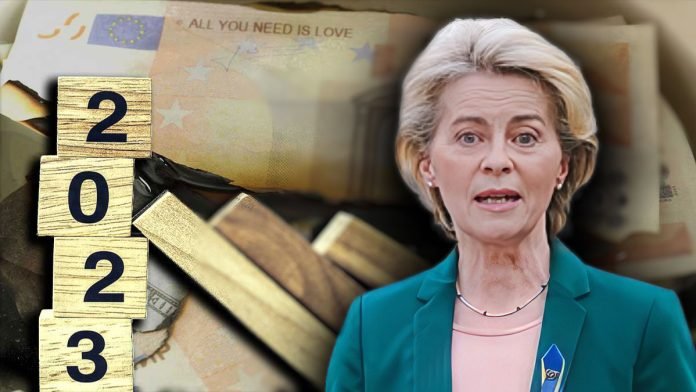Eurozone Slides Into Recession: Energy Crisis and Inflation Weigh Heavily
The eurozone, contrary to previous forecasts, has succumbed to a recession as data released on Thursday revealed a second consecutive quarter of economic contraction. The region’s growth momentum has been gnawed at by a perfect storm of energy shocks, Russia’s war in Ukraine, mounting inflation, and tightening monetary policies, leading to a premature dent in politicians’ optimistic outlook on the eurozone’s economic resilience.
According to revised data from Eurostat, the EU’s statistics office, the GDP of the 20-nation currency area shrank by 0.1 percent in the first three months of 2023.
The situation worsened as the last quarter of 2022 was also revised to a contraction of 0.1 percent, overturning the previous forecast of 0 percent growth.
This confirms the eurozone’s entry into a recession, defined by two successive quarters of economic decline.
These figures make for disheartening reading for governments grappling with Europe’s cost-of-living crisis triggered by Russia’s invasion and the subsequent surge in energy prices. Furthermore, they add pressure on the European Central Bank (ECB), which has resorted to unprecedented interest rate hikes in an attempt to contain record inflation.
The newly revised data reflects a bleaker economic landscape than initially indicated. Flash estimates released in April had suggested a growth of 0.1 percent for the first quarter of the year in the eurozone. The downward correction follows Germany’s data, the largest economy in the eurozone, which exhibited a second consecutive quarter of contraction, plunging into recession.
Notably, eight EU countries experienced economic contraction in the first quarter of 2023, with Ireland suffering the most significant decline of 4.6 percent due to a drop in exports from multinational companies. Lithuania, the Netherlands, Estonia, Malta, Hungary, and Greece also found themselves in negative territory.
On a positive note, employment in the eurozone continued to show growth, increasing by 0.6 percent in the first quarter of this year, up from 0.3 percent in the previous quarter.
The next meeting of the ECB’s governing council to determine interest rates is scheduled for June 15. While a rate hike in June is widely expected, the recent contraction strengthens the case for a pause in further tightening measures. Daniel Kral, senior economist for Europe at Oxford Economics, asserts that there is still more pain to come from the late 2022 tightening measures.
The ECB aims to raise rates to “sufficiently restrictive levels” to bring inflation back to its target of 2 percent over the medium term, as ECB President Christine Lagarde emphasised in her address to the European Parliament. However, the bank estimates that monetary tightening will shrink the GDP by an average of 2 percentage points between 2022 and 2025, with a peak expected this year.
“The muddle-through will continue,” predicts Ludovic Subran, chief economist at Allianz. He suggests that the ECB’s unwavering determination to combat inflation will be tempered by fears of a recession as the eurozone tiptoes through the coming quarters. Prior to the lackluster performance from January to March, the eurozone had already experienced a 0.1 percent contraction in the last quarter of 2022. The consecutive negative GDP performance has now dragged the wider region into a technical recession.
Andrew Kenningham, chief Europe economist at Capital Economics, states that the news of GDP contraction in the first quarter confirms that the eurozone has already fallen into a technical recession. Kenningham further predicts a continued economic contraction throughout the rest of the year.
Several euro economies, including Ireland, the Netherlands, Germany, and Greece, reported a quarter-on-quarter economic contraction in the first quarter. The downturn was reflected in a 0.3 percent drop in household consumption, underscoring the pressures faced by consumers amidst rising prices.
Economist Claus Vistesen of Pantheon Macroeconomics notes that the eurozone region is unlikely to witness significant growth in the months ahead, with expectations of a slowdown in investment.
This lackluster economic environment poses a challenge for the European Central Bank, which has adopted a hawkish stance over the past year and recently set its main rate at 3.25 percent. The central bank’s ability to further increase rates might be limited by a weak economic performance, even as it strives to tackle inflation. ECB officials, however, have previously indicated that bringing down prices takes precedence over avoiding an economic slowdown.
Following the data announcement, eurozone bond yields continued to trade higher on Thursday, with several market players anticipating further monetary tightening.
Early last month the UK missed falling into recession, doing better than predicted.
Support Independent Journalism Today
Our unwavering dedication is to provide you with unbiased news, diverse perspectives, and insightful opinions. We're on a mission to ensure that those in positions of power are held accountable for their actions, but we can't do it alone. Labour Heartlands is primarily funded by me, Paul Knaggs, and by the generous contributions of readers like you. Your donations keep us going and help us uphold the principles of independent journalism. Join us in our quest for truth, transparency, and accountability – donate today and be a part of our mission!
Like everyone else, we're facing challenges, and we need your help to stay online and continue providing crucial journalism. Every contribution, no matter how small, goes a long way in helping us thrive. By becoming one of our donors, you become a vital part of our mission to uncover the truth and uphold the values of democracy.
While we maintain our independence from political affiliations, we stand united against corruption, injustice, and the erosion of free speech, truth, and democracy. We believe in the power of accurate information in a democracy, and we consider facts non-negotiable.
Your support, no matter the amount, can make a significant impact. Together, we can make a difference and continue our journey toward a more informed and just society.
Thank you for supporting Labour Heartlands









